There are many things wrong with Tales from the Triverse, the fiction serial I've been publishing for the last four years.
As of August 2025 I'm closing in on the finale, and it seems like a good time to reflect on what I'd do differently if I were to start over. For context, if you're not familiar with my method, I write and publish my serials as I go, meaning there is no 'complete' manuscript prior to the thing being released into the wild. It's an experience closer to writing a comic or a TV series than it is to writing a novel.
You can check out the serial here:
Other than fixing typos and actual errors, I don't go back to edit previous chapters. If I run myself into a plot dead end, it's up to me to invent a way out of it. Just like a TV show can't retrospectively change what's already happened in previous episodes, because that would be unfair to the viewers. I write and I publish every week, and readers come along for the ride and see the story form up in real time.
I love writing this way, and lots of people seem to enjoy reading, but it inevitably does not afford the same level of editing and redrafting of a more traditional process. I can't perfect the book before people read it. As I close in on the end, I'm in a unique position to look back and consider what I'd have done differently.
Too many characters
Tales from the Triverse was designed to be an ensemble, and was always going to feature a lot of characters. The idea was to have a well-defined police department, a division set up to investigate portal crimes. We'd get to know each of the detectives and the support staff over the course of the serial.
This would have worked fine if they were the only characters. The problem was that there were many supporting characters, guest roles and one-offs. Each story focused on a new investigation, which usually meant establishing victim and perpetrator - a mini-crime fiction tale each time.
As soon as those additional roles are factored in, it squeezes the time left for the core cast. As some of those guest roles turned into recurring roles, or even semi-regulars, it all got quite unwieldy. This meant there was a lot for reader to keep track of, and inevitably some characters ended up getting more screen time than others.
The large cast makes the story feel big and real, and the messiness is at times a positive attribute. When the forensic pathologist Wong shows up, it's a fun bonus - like when a character actor shows up for a couple of episodes, but is never going to become a lead. Each individual story features compelling character within that story space.
It's when the character arcs are observed over the entire course of the serial's run that the flaws appear. Specifically:
Nisha's character arc
One of the lead detective characters, Nisha Chakraborty has a strong presence in the first half of the serial. Strong motivation rooted in the serial's opening storyline, a problematic and self-destructive personality, and a very personal arc to explore.
The main story veered off in other directions, with other characters coming to the fore. Crucially, much of Chakraborty's key development moments (such as finally dealing with her alcoholism) happen largely off-screen, and it ends up feeling a bit hand-wavey. This is my biggest regret of the series, and the area most likely to be reworked in subsequent editions.
I love Nisha's character, and her core arc needs to be threaded through the story more deftly, especially where the time skip is concerned. This is all fixable, but I didn't recognise it in time to work in a solution during the original run.
That said, I did spot the issue in time to rework her involvement in the finale, bringing her character full circle and reminding everyone of who she is and where she's come from. It resonates at the end, but Nisha's second act is the weak point.
The antagonists are too off-screen
There are two types of antagonist in Triverse. There are those in the individual stories, who feature for a handful of chapters during a specific investigation. These tend to only appear in those stories and don't show up again. They either escape or are caught by the detectives.
Then there's the arc antagonists, who are recurring characters and continual presences throughout the entire series. Working them into the weekly serial proved to be tricky, not least because the first half of the run was a conspiracy mystery: our leads are trying to figure out what the hell is going on, which meant holding back the antagonists for fear of giving the game away.
This also meant there is a lot of implied character development, a lot of off-screen developments and third hand accounts. They are kept at arm's length, until the final act at which point they come to the fore. The problem being that readers won't necessarily have recognised their subtle earlier appearances.
I remember reading interviews with Peter Jackson about adapting The Lord of the Rings for film, and how they struggled with the lack of active baddies. Sauron is a non-corporeal flaming eyeball for most of the story. The Ring is a force of evil that refuses to be properly defined. The Ring Wraiths are there for a while in Fellowship, but disappear for extended stretches.
Hence in the films there are recognisable, named orcs. Saruman's role is increased and interspersed throughout the films. A lot of tweaking was done to address the baddies being a piece of jewellery and a hot circle. This is an issue with Triverse as well, and I'm not sure what I'd do to fix it.
I'm not even certain that it needs fixing. It's an aspect that I find hard to assess from my point of view, and really need to check through reader responses to find out.
The finale has meant abandoning the crime fiction structure
For most of its run, Tales from the Triverse adhered to a very clear structure: each storyline consisted of a handful of chapters (give or take) and would focus on a single, specific investigation. The police would hunt for evidence, do detective work, and try to figure out what happened and who did it. Classic crime fiction, in micro-doses.
Along the way, each case was an excuse to explore an interesting aspect of society, culture or history, with the Triverse setting providing interesting metaphors for the real world.
Meanwhile, in the background, the main arc quietly trundled along, occasionally coming to the fore. It's a structure based on US television from the 90s and 2000s, where most episodes are standalone, but with occasional 'arc' elements sneaking in. Occasionally there would be a more arc-heavy episode, usually at the end of the season.
This carried on for the first two and a half years of Triverse. There was a schism in the story that was always planned, though: a point of no return that would upend everything readers had come to expect. This was exciting but also risky, and I'm still not sure if it works. At a critical moment, the police department is disbanded and the detectives are no longer able to carry out their jobs. The crime fiction structure crumbles away and the stakes get significantly higher for our lead characters.
This takes the story into its final act, which shifts to a more novelistic structure in which every storyline is keyed directly into the main arc. There are no 'filler' episodes, and everything is core plot.
I like stories which establish a formula only to blow it up, but part of me also misses the original crime fiction structure. Could Triverse have stayed as that forever? Did I really need to segue into the more classic science fiction and fantasy adventure territory?
Critics often bemoan Marvel films being interesting for their first two thirds, then devolving into typical, cookie cutter punchy-punchy CGI for the endings. I sometimes wonder if I've fallen into the same trap with Triverse. Readers seem to be enjoying the series more than ever, but I do wonder if there's a lower key alternate version that could have been.
Alternate history is an underused asset
I have a 200 hundred year alternate history planned out that forms the backbone of Tales from the Triverse. It motivates most of the antagonists and is the foundation of the status quo in which the main story starts. But it's also criminally under-explored.
I never got to have fun with the alternate pan-dimensional Napoleonic War. I could only allude to the assassination of the founding fathers of the USA, rather than showing it. I didn't get to examine what it meant to avoid World War 1 and WW2, and how that drastically changed the geopolitical landscape in the West. The British Empire is going strong in the 1970s, but there wasn't room to explore the how and the why, or to properly interrogate what that would mean for the rest of the world.
None of that got in, because none of it is relevant to the actual story being told. To go off on too many Lore Diversions would have diminished the overall tale. But it still feels like a missed opportunity.
Perhaps those are other stories I can tell separately, away from the main story and the crime fiction structure. I could keep writing standalone short stories set in the Triverse universe without ever running out of ideas.
Too damned long
Tales from the Triverse is over 360,000 words and 200 chapters long, and has been releasing weekly chapters for over four years. Some readers have been along for the entire ride, which is nuts.
But, let's face it: it's too much. Too many words, too many chapters, too many weeks, too many years. It's been a challenge for me, and no doubt a challenge for readers. I doubt there's been another serial this huge published via a Substack-powered newsletter.
A newsletter is an awkward fit for this kind of serial. Navigation is awkward. If a reader jumps on halfway through, it's really tricky to go back to the start. The UX just isn't there for long-form serial fiction.
I could have published through something like Wattpad, which is designed for this sort of project. But then I'd have had no control over my audiences, and I wouldn't have been able to simultaneously publish a non-fiction newsletter about writing serials, or build a list of over 9,000 readers.
Future projects, though, will definitely be smaller. Short stories, novellas, multi-part series that can be completed in weeks rather than months or years.
Was it worth it?
Considering all of the above, was Tales from the Triverse worth it? I dedicated years of my life to it, and have been unable to work on other fiction projects for that entire time. It's by far the biggest thing I've ever created.
Despite my misgivings listed above, I remain thrilled with how the project turned out. It's been creatively satisfying at every turn. There's never been a week that hasn't been a challenge in its own, unique way. I've had to learn new skills and figure out how to solve countless problems.
Readers have shown up. I've had lovely comments from people who have clearly enjoyed the ride, including people who have shown up quite late in the day and still somehow managed to figure out what's going on. I'm enormously grateful to every reader, from veterans who have stuck around since the beginning, to people who have dropped by for specific stories.
I probably don't have another serial project of this scale in my future. Along with The Mechanical Crown, which was a three year endeavour, it's been a lot. I'm excited about jumping into lots of smaller, more experimental projects once I finally write THE END on Triverse.
I have to nod in the direction of Joshua Lavender, who wrote a debrief on his own serial and inspired me to put today's post together. Go check out his post (and his story!) here:
I’m still travelling at the moment, so I’m going to wrap it up there. Thanks for reading!




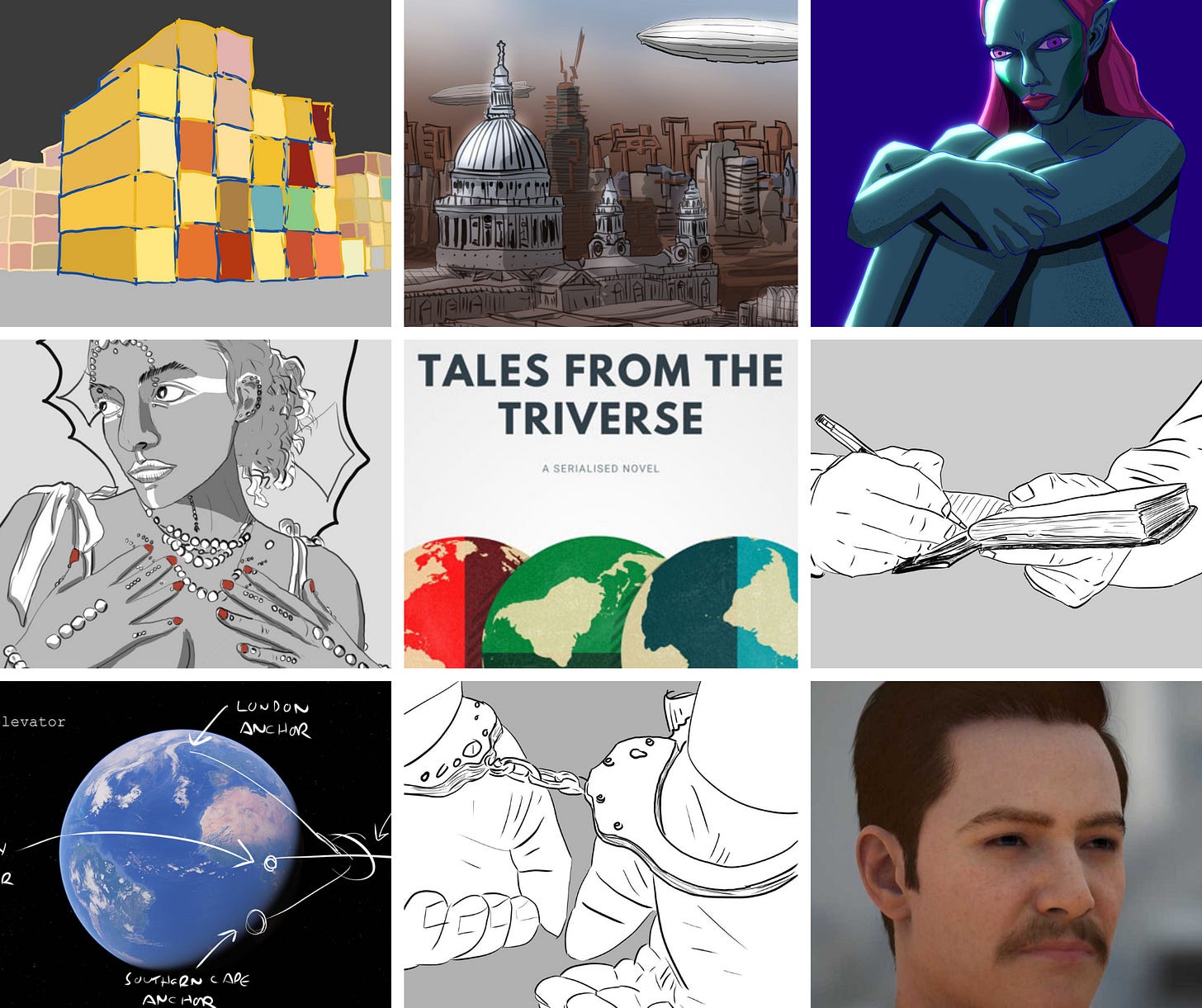

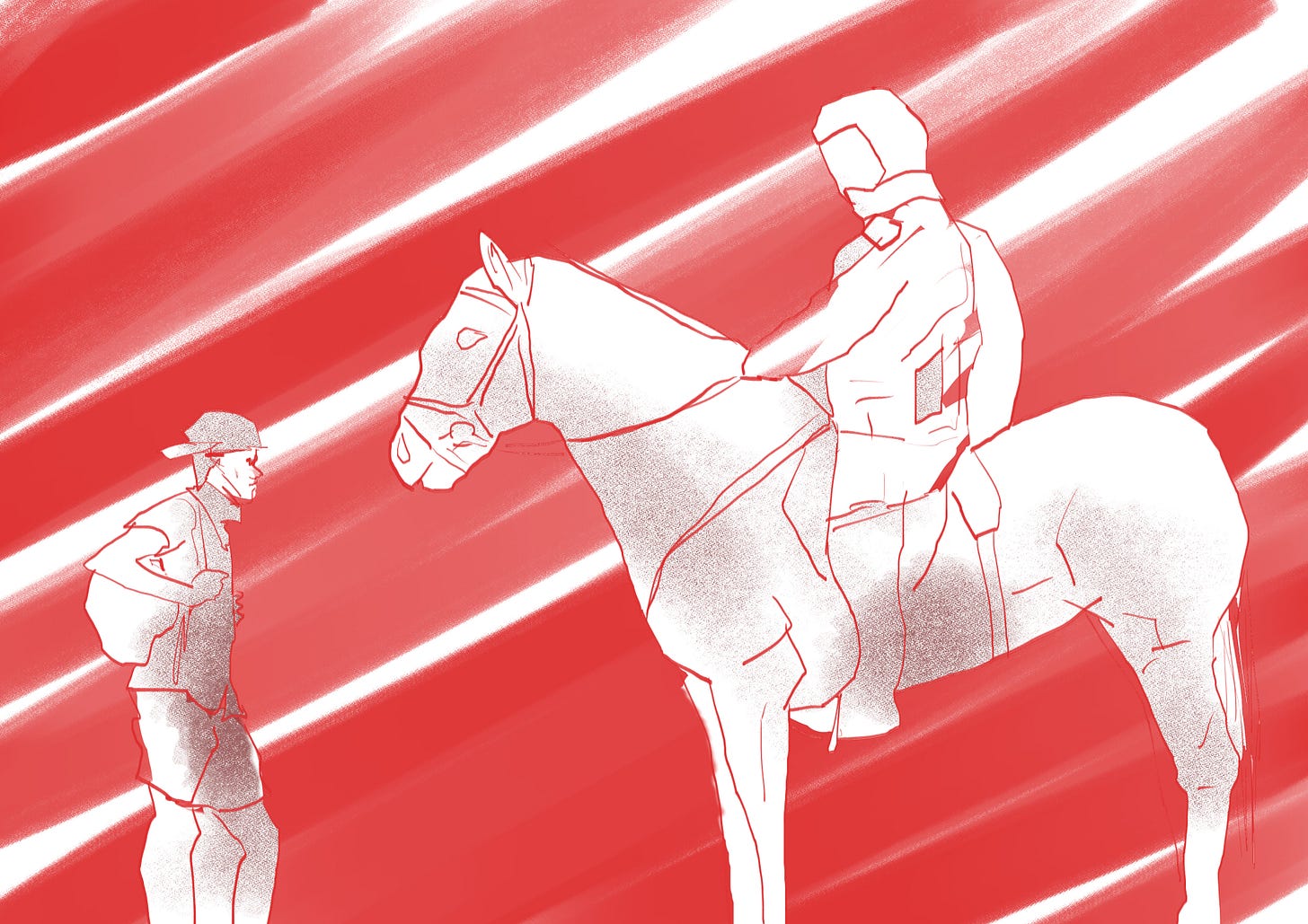
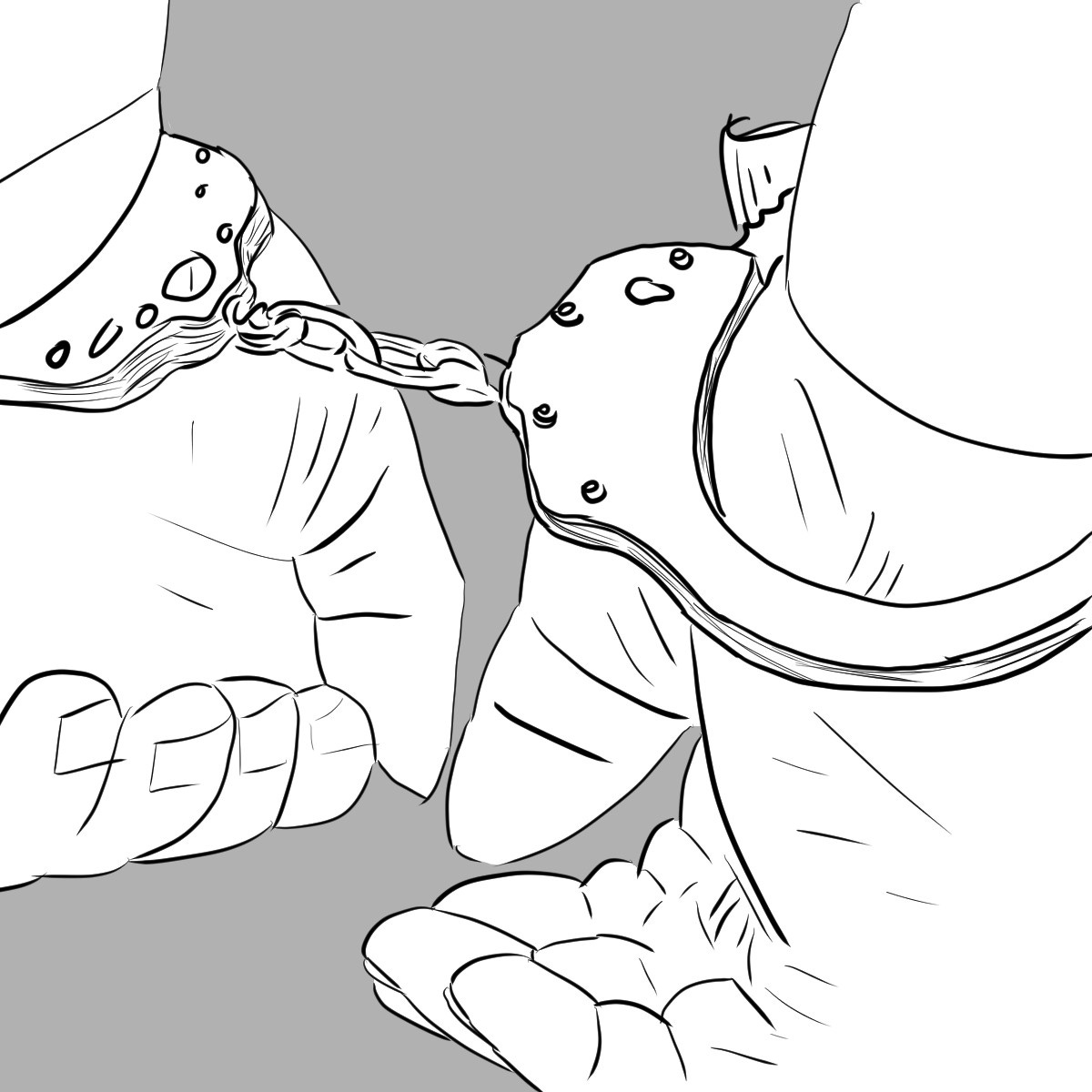
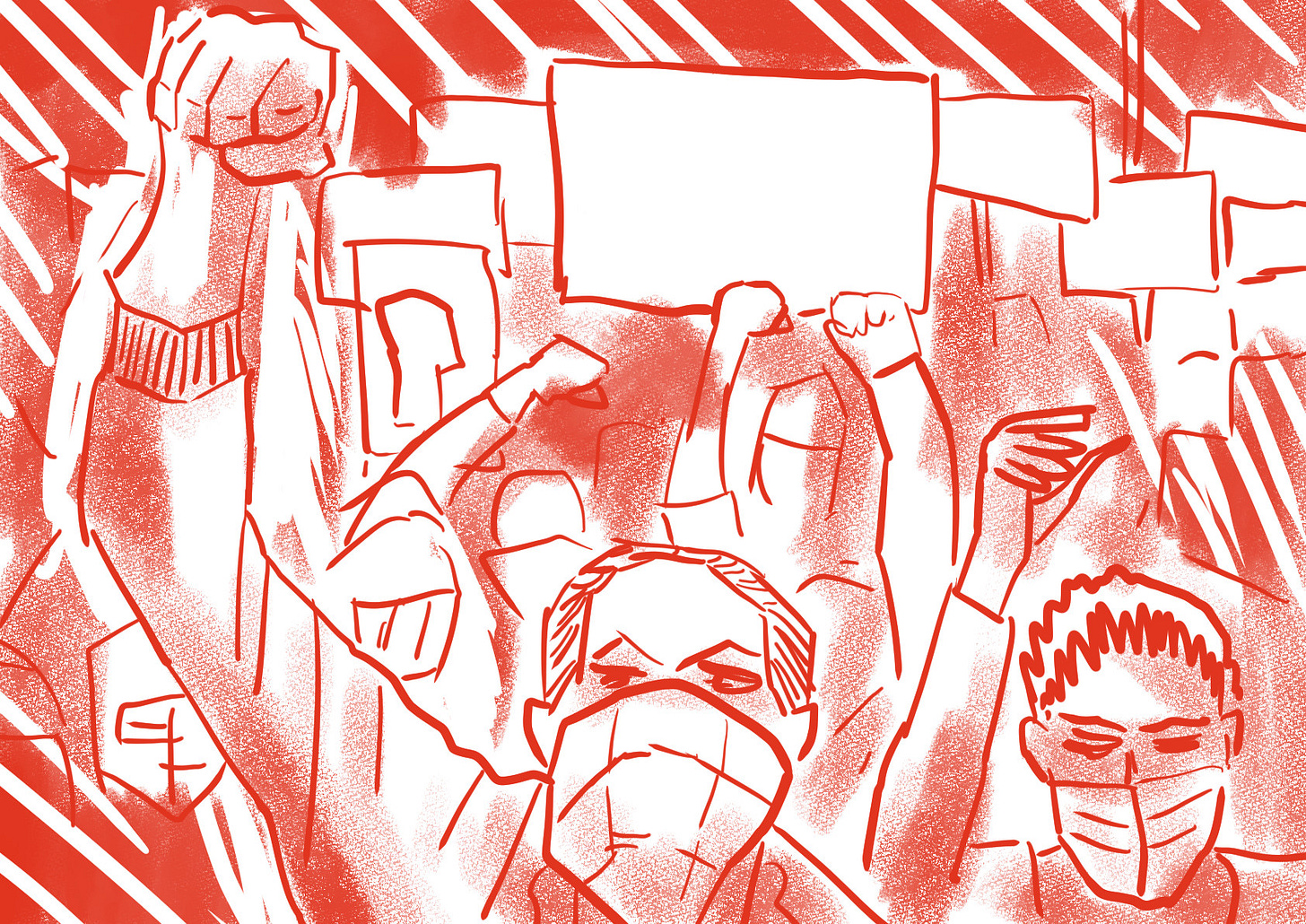
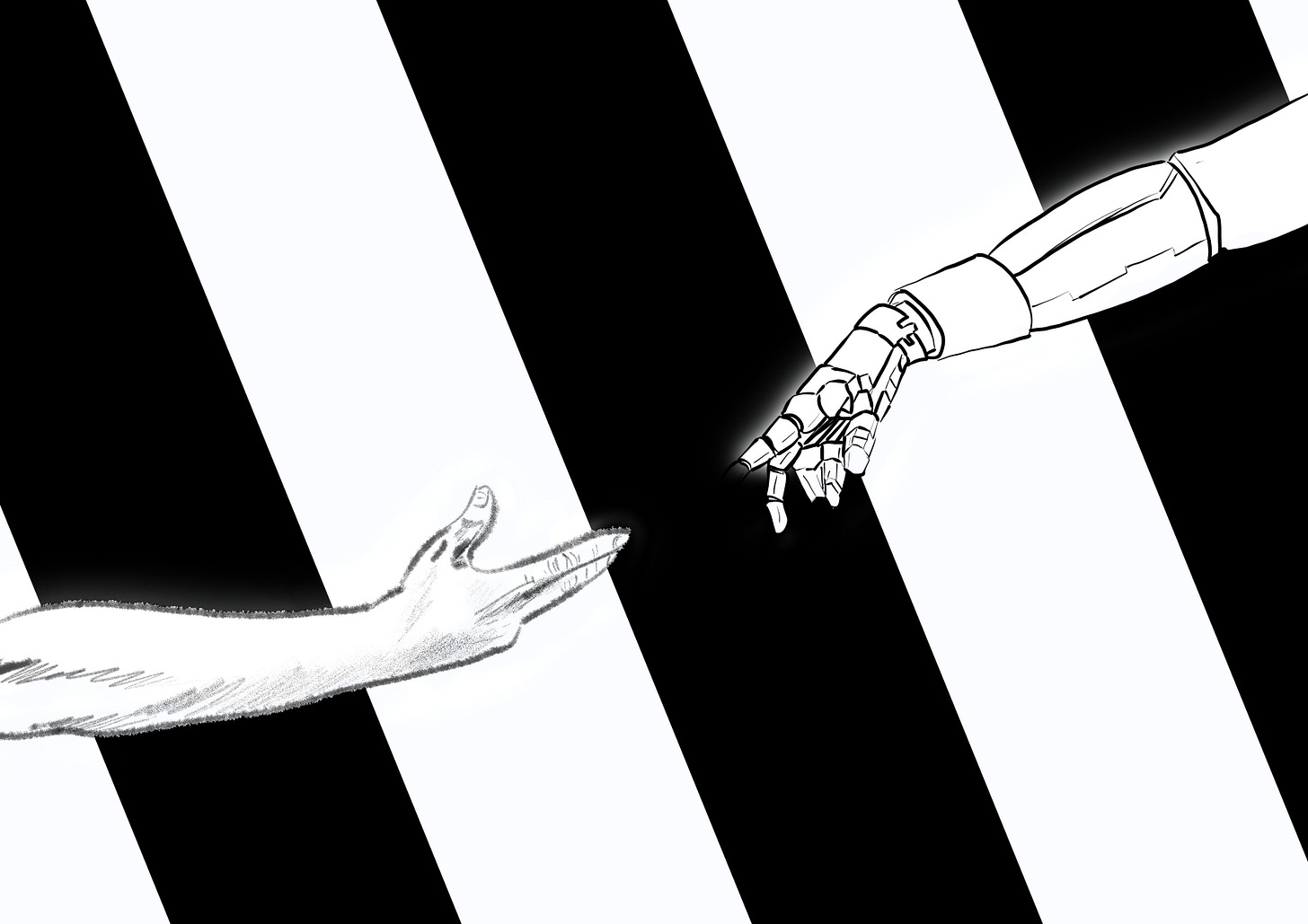

I mean, yeah, fair points. Can't argue with them as I've probably said similar things at times (the weekend discussion of Nisha, and I probably said at one point something like "anthology structure and real time between chapters is letting you get away with XYZ happening off screen.
Still, as JL Tooker said, you'd need a much (MUCH) longer debrief for what went right.
Four years of publishing a first draft chapter-by-chapter is no joke. To pull it off as successfully as you have is amazing. I don't read your writing because we're friends, but because it's good. I have plenty of other friends whose artistic endeavors I don't follow regularly.
I'd love some occasional additional Tales from the Triverse getting more into the past of Palinor, and the alternate history of Mid-Earth.
Regarding the format switch, you happened to give yourself some baked in leeway back at the start. "TALES of the Triverse." There's a pseudo-anthology structure implied right up in the title. You didn't break the format of a novel 2/3 in, you just shifted to different tales in a different genre with the same characters and setting.
The same gives you room to later publish say "Valley Unforged: a Tale of the Triverse" and do the assassination of George Washington. (Took a few minutes to find a title. Free free to bank that, because that's actually good.)
"A lot of tweaking was done to address the baddies being a piece of jewellery and a hot circle" - nice.
Of the points you wished you'd had more opportunity to flesh out, there will always be opportunities to revisit those in a smaller self-contained project.
And I know what you mean about the joy small endings. My first elf-pub, The Forcek Assignment, was no great literature but I remain proud that, after some hefty gunplay, the final showdown was a conversation.